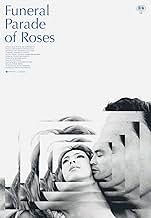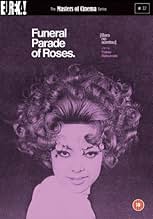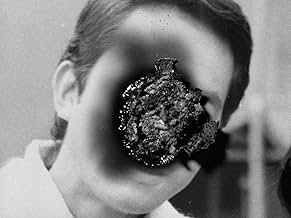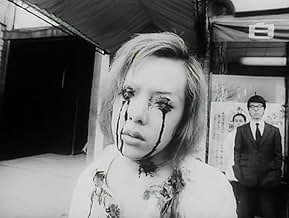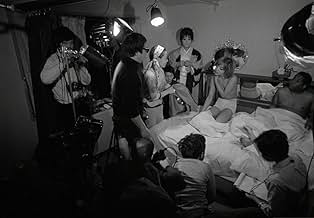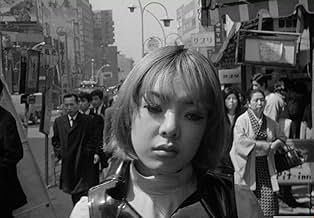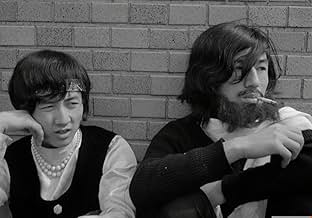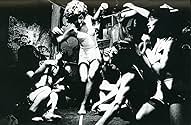VALUTAZIONE IMDb
7,7/10
8015
LA TUA VALUTAZIONE
Le prove e le tribolazioni di Eddie e altri travestiti in Giappone.Le prove e le tribolazioni di Eddie e altri travestiti in Giappone.Le prove e le tribolazioni di Eddie e altri travestiti in Giappone.
- Regia
- Sceneggiatura
- Star
Recensioni in evidenza
If you really are looking for a good time in a movie theatre - watch this movie ! It has been said that some of Kubrick's visual and sonic ideas for "Clockwork Orange" were inspired by this movie; after having seen it, i'm more than convinced that this is true.
This movie offers a lot of cinematic ideas and it uses surprising ways to make a point within a story.
What is the reason that films with a spirit and mood like that have vanished from the screen ? Have the politics in the movie industry really become so strict ? This movie watched nowadays has (but maybe had always) a subversive feel to it, why is that ?
It definitely offers something different and therefore would be very welcome in movie theatres and videostores around the world to free us from all the uninspired formula movies.
This movie offers a lot of cinematic ideas and it uses surprising ways to make a point within a story.
What is the reason that films with a spirit and mood like that have vanished from the screen ? Have the politics in the movie industry really become so strict ? This movie watched nowadays has (but maybe had always) a subversive feel to it, why is that ?
It definitely offers something different and therefore would be very welcome in movie theatres and videostores around the world to free us from all the uninspired formula movies.
Eddie is a transvestite hostess at one of Tokyo's clubs. He/she spends her time working, being in the films of a friend, taking drugs and trying to find love.
Said to be one of Stanley Kubrick's favorite films and a big influence on Clockwork Orange this is probably one of the best films most people have never seen. Released in 1969 this film is as fresh and shattering as it must have been back when it was made. Set in a "Gay" world this is actually a movie about people and how they act and feel, the fact that they are gay is irrelevant. These are real people in a real world that seems to be happening now instead of when it was made (due no doubt to the stunning black and white photography). The film uses just about every 1960 "art film" technique you can think of and does so better than any film in from Europe ever did (Buñuel, and Bergman should have been this successful). Interviews of the cast, sudden juxtaposition of scenes, shifts in tone and style, sudden bursts of violence, all blend together to tell a story of a search for identity and place that is in its way universal, even if its outcome is not.
This is a movie that is simple to explain, but difficult to sum up. The effect of it being somewhat greater than the simplicity of the storyline.
See this movie. This is one of those movies that movie lovers should search out.
9 out of 10 (Because to be honest I'm not sure if I'm more in love with the technique or the film itself- though either way its a great film)
Said to be one of Stanley Kubrick's favorite films and a big influence on Clockwork Orange this is probably one of the best films most people have never seen. Released in 1969 this film is as fresh and shattering as it must have been back when it was made. Set in a "Gay" world this is actually a movie about people and how they act and feel, the fact that they are gay is irrelevant. These are real people in a real world that seems to be happening now instead of when it was made (due no doubt to the stunning black and white photography). The film uses just about every 1960 "art film" technique you can think of and does so better than any film in from Europe ever did (Buñuel, and Bergman should have been this successful). Interviews of the cast, sudden juxtaposition of scenes, shifts in tone and style, sudden bursts of violence, all blend together to tell a story of a search for identity and place that is in its way universal, even if its outcome is not.
This is a movie that is simple to explain, but difficult to sum up. The effect of it being somewhat greater than the simplicity of the storyline.
See this movie. This is one of those movies that movie lovers should search out.
9 out of 10 (Because to be honest I'm not sure if I'm more in love with the technique or the film itself- though either way its a great film)
In a key moment around the half-way mark in Toshio Matsumoto's Funeral Parade of Roses, the young protagonist Eddie, a transsexual working in Tokyo, stabs his mother's lover and then his mother himself. Matsumoto's film is full of Oedipal subtexts, but here Eddie kills his mother to (perhaps) get to his father, so it is the reverse of the Oedipus story. In fact, most of the film is 'backwards' in the traditional sense, full of narrative tricks, contrasting styles and shifts in tone, moving from melodrama to documentary to horror with each scene.
Eddie (played by real-life queen Pita) is a drag-queen working at a top Tokyo underground club ran by Gonda (Yoshio Tsuchiya). Eddie is the top attraction at the club, much to the envy of ageing madam Leda (Osamu Ogasawara). When Gonda starts a secret affair with Eddie, Leda finds out and plans to hurt and disfigure Eddie in her jealousy. Running alongside this fictional storyline are various interviews with the real-life queens who act in the film, who offer insights about life in Tokyo for queens and how the film will represent them.
There was a huge boom in Japan in the 1960's of films now known as Japanese New Wave. Funeral Parade of Roses is certainly one of the most daring and technically innovative, stripping back genre (and even cinematic) conventions to create one of the most important films in the history of Gay Cinema. This leads to an occasionally confusing and head- spinning film, that can switch quickly from a generic love scene to a moment of avant-garde (an argument between two queens have them shouting at each other with speech bubbles) to a bloody set-piece. One of the most inspirational films to come out of Japan, this was a favourite of Stanley Kubrick's, and no doubt the scenes that are played out in fast- forward were an influence on A Clockwork Orange (1971). Uncompromising, unapologetic cinema.
www.the-wrath-of-blog.blogspot.com
Eddie (played by real-life queen Pita) is a drag-queen working at a top Tokyo underground club ran by Gonda (Yoshio Tsuchiya). Eddie is the top attraction at the club, much to the envy of ageing madam Leda (Osamu Ogasawara). When Gonda starts a secret affair with Eddie, Leda finds out and plans to hurt and disfigure Eddie in her jealousy. Running alongside this fictional storyline are various interviews with the real-life queens who act in the film, who offer insights about life in Tokyo for queens and how the film will represent them.
There was a huge boom in Japan in the 1960's of films now known as Japanese New Wave. Funeral Parade of Roses is certainly one of the most daring and technically innovative, stripping back genre (and even cinematic) conventions to create one of the most important films in the history of Gay Cinema. This leads to an occasionally confusing and head- spinning film, that can switch quickly from a generic love scene to a moment of avant-garde (an argument between two queens have them shouting at each other with speech bubbles) to a bloody set-piece. One of the most inspirational films to come out of Japan, this was a favourite of Stanley Kubrick's, and no doubt the scenes that are played out in fast- forward were an influence on A Clockwork Orange (1971). Uncompromising, unapologetic cinema.
www.the-wrath-of-blog.blogspot.com
A pretty unique film, one which represents transvestite characters in an adaptation of a classical Greek story, executed in a new wave film style. It's a lot, and there were times while watching it that I thought director Toshio Matsumoto was trying to do just a little too much. If you're wondering a bit during silly scenes like the joint being passed around, or what the point of all those butts are, one sporting a protruding rose, well, I would just say 'bare' with it, because it pulls together well over the back half. The lead character, Eddie (short for Oedipus, get it?), is striking, and frankly I thought Peter was a big part of what made the film successful.
The film felt a little close to making this culture a part of a carnival, e.g. with fight scenes given to us in fast motion and with circus music, and when the interviewer asks questions of characters/actors in condescending ways. There are gay sex scenes which seems quite daring for the period, though Matsumoto seems to want to reassure us that nothing's actually happening by suddenly showing the film crew around the actors, and how the whole thing is just being simulated. I worried a little bit that the culture was just being used for shock value along with the new wave style, and compounded by the perversion of the original story.
However, overall I think we see a sympathetic humanization here, something that's pretty amazing for 1969. The characters suffer the pangs of love and jealousy as anyone else would, and also hardships growing up that are all their own. Masks and mirrors play a big role in the film, but what I loved was that while these characters are wearing masks maybe to conceal their inner demons and the pain in their lives, they're not wearing them or pretending to be something they're not by dressing as women. Ironically, we see that they are being true to themselves, and in that sense, wearing less of a mask by doing so. The best moments for me were in the candid, honest replies to the interview questions, and I wish there would have been more of this. The imagery at the end is also especially powerful, and seems to amplify the isolation of this poor young man from the society around him, who simply gape in astonishment.
The film felt a little close to making this culture a part of a carnival, e.g. with fight scenes given to us in fast motion and with circus music, and when the interviewer asks questions of characters/actors in condescending ways. There are gay sex scenes which seems quite daring for the period, though Matsumoto seems to want to reassure us that nothing's actually happening by suddenly showing the film crew around the actors, and how the whole thing is just being simulated. I worried a little bit that the culture was just being used for shock value along with the new wave style, and compounded by the perversion of the original story.
However, overall I think we see a sympathetic humanization here, something that's pretty amazing for 1969. The characters suffer the pangs of love and jealousy as anyone else would, and also hardships growing up that are all their own. Masks and mirrors play a big role in the film, but what I loved was that while these characters are wearing masks maybe to conceal their inner demons and the pain in their lives, they're not wearing them or pretending to be something they're not by dressing as women. Ironically, we see that they are being true to themselves, and in that sense, wearing less of a mask by doing so. The best moments for me were in the candid, honest replies to the interview questions, and I wish there would have been more of this. The imagery at the end is also especially powerful, and seems to amplify the isolation of this poor young man from the society around him, who simply gape in astonishment.
An all-night Italian TV program entitled "Fuori Orario" - which translates to "After Hours" - comprised of back-to-back films of all genres, nationalities and vintage, and hosted by an eccentric highbrow critic named Enrico Ghezzi - has for years been the fount of several interesting titles which, if it hadn't been for him, I would never have heard of, let alone watched (though I'd say that about a third of the alarming 500+ still-unwatched films I own on VHS are culled from that program!).
Anyway, FUNERAL PARADE OF ROSES is one such example: when I learned it was scheduled to be shown, I made a cursory search via the Internet about the film and, from the little I found, I singled it out as one to record. However, I didn't watch it immediately (mainly because, unfortunately, the tape I used for the recording was some 20 years old and still has a habit of halting playback automatically and subsequently refusing to load!; in fact, a couple of weeks back I lost two early Shohei Imamura films I unwisely taped on a similarly fragile VHS) but, since that time, I've come across a few more references to Matsumoto's film - most recently its being announced as a forthcoming Region 2 DVD release from the impressive "Masters Of Cinema" label - which have only intrigued me even more. Then, yesterday, as I was listening to Tony Rayns' Audio Commentary for Hiroshi Teshigahara's unusual debut PITFALL (1962) - incidentally a Eureka/MoC edition - he mentioned the film once again (and, perhaps unwittingly, proceeded to give away the devastating plot twist at the film's conclusion!) in the context of its similarly unconventional nature. So, this time, I decided not only to watch FUNERAL PARADE OF ROSES at long last - whatever the condition of the tape which, fortuitously, turned out to be not too bad - but, being in something of an art-house/Asian cinema vein, I made a whole list of (mostly just as obscure) titles to follow...
Now, after this long-winded introduction, let's get down to the business at hand: a potentially off-putting subject matter (the trials and tribulations of a community of transvestites) is transformed by the writer-director's aggressively experimental style, drawing on the contemporary free-form technique of European films rather than the cinematic conventions which are traditionally Japanese. In fact, the narrative (if it can even be called that, in view of its many flashbacks, flash-forwards and repeated actions) is frequently interrupted by having the cast sit down for interviews being filmed by a TV crew; interestingly, Ingmar Bergman's contemporaneous THE PASSION OF ANNA (1969) used a similarly unique device to "explain" his characters' motivations, as it were. Despite its generally serious tone, seemingly a requisite for an art-house film, FUNERAL PARADE OF ROSES is not devoid of humor or, at the very least, a distinct sense of the absurd: the catfight scenes between the "women" are shot in accelerated motion - a technique allegedly borrowed from this film by Stanley Kubrick for A CLOCKWORK ORANGE (1971)!; the scene of a trio of transvestites taking a leak in a men's lavatory (much to the consternation of those present); the linking image of a line-up of naked men with one of them having a rose firmly planted between his butt-cheeks; a revolutionary hippie named Guebara having a sneezing fit in extreme close-up; and the moment during one of the pauses for interviews when a crew member slinks past the camera filming the actor playing the man pretending to be a woman (are you confused yet?) holding a dead rat by the tail! With regards to Peter, the lead actor (who, amazingly, later turned up as The Fool in RAN [1985], Kurosawa's masterful adaptation of Shakespeare's "King Lear"), I have to say that he makes for a very convincing female impersonator - to the point where, if it weren't for his clearly masculine voice, one forgets that he's actually watching a man in drag! The love scenes (which, thankfully, aren't very explicit) are sensitively handled and, in general, the film doesn't sentimentalize the gay community - nor does it criticize the drug scene which seems to be as much a part of their lifestyle as anything else. As I said earlier, I knew of the film's reversal of Greek tragedy at the climax from Tony Rayns' commentary for PITFALL but, given its complex structure, I was still blown away by the revelation which, in turn, leads to an extremely violent ending that is not easily forgotten. By the way, I found the brownish hue of the black-and-white cinematography to be an interesting touch: I don't know if this was done intentionally, or whether it was just a feature of the print I happened to watch - but, at this juncture, I think I'd be somewhat disappointed if this unique "dirty" look were missing from the film once the upcoming DVD is released (perhaps anyone who might own the Japanese disc could chime in about this?)...
FUNERAL PARADE OF ROSES was, by all accounts, an remarkable debut feature for Toshio Matsumoto; he followed it with only 3 more films but, from the little I've read about them, they sound interesting too and well worth seeking out (so far they have only been available as part of a Japanese Limited Edition Box Set, though not all the films feature English subtitles!).
Anyway, FUNERAL PARADE OF ROSES is one such example: when I learned it was scheduled to be shown, I made a cursory search via the Internet about the film and, from the little I found, I singled it out as one to record. However, I didn't watch it immediately (mainly because, unfortunately, the tape I used for the recording was some 20 years old and still has a habit of halting playback automatically and subsequently refusing to load!; in fact, a couple of weeks back I lost two early Shohei Imamura films I unwisely taped on a similarly fragile VHS) but, since that time, I've come across a few more references to Matsumoto's film - most recently its being announced as a forthcoming Region 2 DVD release from the impressive "Masters Of Cinema" label - which have only intrigued me even more. Then, yesterday, as I was listening to Tony Rayns' Audio Commentary for Hiroshi Teshigahara's unusual debut PITFALL (1962) - incidentally a Eureka/MoC edition - he mentioned the film once again (and, perhaps unwittingly, proceeded to give away the devastating plot twist at the film's conclusion!) in the context of its similarly unconventional nature. So, this time, I decided not only to watch FUNERAL PARADE OF ROSES at long last - whatever the condition of the tape which, fortuitously, turned out to be not too bad - but, being in something of an art-house/Asian cinema vein, I made a whole list of (mostly just as obscure) titles to follow...
Now, after this long-winded introduction, let's get down to the business at hand: a potentially off-putting subject matter (the trials and tribulations of a community of transvestites) is transformed by the writer-director's aggressively experimental style, drawing on the contemporary free-form technique of European films rather than the cinematic conventions which are traditionally Japanese. In fact, the narrative (if it can even be called that, in view of its many flashbacks, flash-forwards and repeated actions) is frequently interrupted by having the cast sit down for interviews being filmed by a TV crew; interestingly, Ingmar Bergman's contemporaneous THE PASSION OF ANNA (1969) used a similarly unique device to "explain" his characters' motivations, as it were. Despite its generally serious tone, seemingly a requisite for an art-house film, FUNERAL PARADE OF ROSES is not devoid of humor or, at the very least, a distinct sense of the absurd: the catfight scenes between the "women" are shot in accelerated motion - a technique allegedly borrowed from this film by Stanley Kubrick for A CLOCKWORK ORANGE (1971)!; the scene of a trio of transvestites taking a leak in a men's lavatory (much to the consternation of those present); the linking image of a line-up of naked men with one of them having a rose firmly planted between his butt-cheeks; a revolutionary hippie named Guebara having a sneezing fit in extreme close-up; and the moment during one of the pauses for interviews when a crew member slinks past the camera filming the actor playing the man pretending to be a woman (are you confused yet?) holding a dead rat by the tail! With regards to Peter, the lead actor (who, amazingly, later turned up as The Fool in RAN [1985], Kurosawa's masterful adaptation of Shakespeare's "King Lear"), I have to say that he makes for a very convincing female impersonator - to the point where, if it weren't for his clearly masculine voice, one forgets that he's actually watching a man in drag! The love scenes (which, thankfully, aren't very explicit) are sensitively handled and, in general, the film doesn't sentimentalize the gay community - nor does it criticize the drug scene which seems to be as much a part of their lifestyle as anything else. As I said earlier, I knew of the film's reversal of Greek tragedy at the climax from Tony Rayns' commentary for PITFALL but, given its complex structure, I was still blown away by the revelation which, in turn, leads to an extremely violent ending that is not easily forgotten. By the way, I found the brownish hue of the black-and-white cinematography to be an interesting touch: I don't know if this was done intentionally, or whether it was just a feature of the print I happened to watch - but, at this juncture, I think I'd be somewhat disappointed if this unique "dirty" look were missing from the film once the upcoming DVD is released (perhaps anyone who might own the Japanese disc could chime in about this?)...
FUNERAL PARADE OF ROSES was, by all accounts, an remarkable debut feature for Toshio Matsumoto; he followed it with only 3 more films but, from the little I've read about them, they sound interesting too and well worth seeking out (so far they have only been available as part of a Japanese Limited Edition Box Set, though not all the films feature English subtitles!).
Lo sapevi?
- QuizIl funerale delle rose (1969) gave Stanley Kubrick several visual and aural inspirations for his adaptation of Arancia meccanica (1971).
- BlooperTutte le opzioni contengono spoiler
- ConnessioniEdited from Ecstasis (1969)
- Colonne sonoreO du lieber Augustin
I più visti
Accedi per valutare e creare un elenco di titoli salvati per ottenere consigli personalizzati
- How long is Funeral Parade of Roses?Powered by Alexa
Dettagli
Botteghino
- Lordo in tutto il mondo
- 1114 USD
- Tempo di esecuzione
- 1h 45min(105 min)
- Colore
- Mix di suoni
- Proporzioni
- 1.37 : 1
Contribuisci a questa pagina
Suggerisci una modifica o aggiungi i contenuti mancanti


